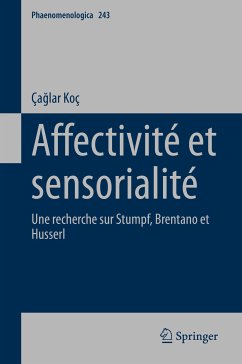Ce livre aborde les ouvrages de trois philosophes : Carl Stumpf, Franz Brentano et Edmund Husserl. Il se concentre sur les textes qui portent sur l'affectivité¿, la valorisation et la classification des sentiments. L'intérêt de l'auteur est particulièrement centré sur les sentiments sensoriels. En prenant pour fil conducteur l'expérience de la douleur et le cas du masochisme, l'auteur tente d'avancer une problématique originale, à l'aide de laquelle il parvient à montrer les avantages de la position de Husserl concernant les sentiments sensoriels par rapport aux positions de Stumpf et de Brentano. L'étude vise à faire dialoguer la phénoménologie et la psychologie descriptive avec la philosophie de l'esprit aussi bien qu'avec les débats contemporains sur la douleur et le plaisir dans la philosophie des sentiments. Cependant, l'objectif de cette étude ne consiste pas seulement à s'enquérir des sentiments sensoriels. La tâche plus générale est de mettre au jour la structure de la conscience affective selon les trois philosophes. L'originalité de ce livre réside dans le fait qu'il cherche à atteindre les différences subtiles entre nos sentiments sur la base d'une phénoménologie affective, d'inspiration husserlienne. Il présente une exégèse nouvelle des manuscrits de Husserl sur les sentiments.
This book deals with the works of three philosophers: Carl Stumpf, Franz Brentano, and Edmund Husserl. It focuses on texts that concern affectivity, valuation, and classification of feelings. The author's interest is particularly centered on sensory feelings. Taking as a common thread the experience of pain and the case of masochism, the author attempts to put forward an original problem, with the help of which he succeeds in showing the advantages of Husserl's position concerning sensory feelings in relation to the positions of Stumpf and Brentano. The study aims to bring phenomenology and descriptive psychology into dialogue with the philosophy of mind as well as with contemporary debates on pain and pleasure in the philosophy of emotions. However, the purpose of this study is not only to inquire about sensory feelings. The more general task is to bring to light the structure of affective consciousness according to the three philosophers. The originality of this book lies in the fact that it seeks to reach the subtle differences between our feelings on the basis of an affective phenomenology, of Husserlian inspiration. It presents a new exegesis of Husserl's manuscripts on feelings and appeals to researchers and students in the field.
This book deals with the works of three philosophers: Carl Stumpf, Franz Brentano, and Edmund Husserl. It focuses on texts that concern affectivity, valuation, and classification of feelings. The author's interest is particularly centered on sensory feelings. Taking as a common thread the experience of pain and the case of masochism, the author attempts to put forward an original problem, with the help of which he succeeds in showing the advantages of Husserl's position concerning sensory feelings in relation to the positions of Stumpf and Brentano. The study aims to bring phenomenology and descriptive psychology into dialogue with the philosophy of mind as well as with contemporary debates on pain and pleasure in the philosophy of emotions. However, the purpose of this study is not only to inquire about sensory feelings. The more general task is to bring to light the structure of affective consciousness according to the three philosophers. The originality of this book lies in the fact that it seeks to reach the subtle differences between our feelings on the basis of an affective phenomenology, of Husserlian inspiration. It presents a new exegesis of Husserl's manuscripts on feelings and appeals to researchers and students in the field.
Dieser Download kann aus rechtlichen Gründen nur mit Rechnungsadresse in A, B, BG, CY, CZ, D, DK, EW, E, FIN, F, GR, HR, H, IRL, I, LT, L, LR, M, NL, PL, P, R, S, SLO, SK ausgeliefert werden.









